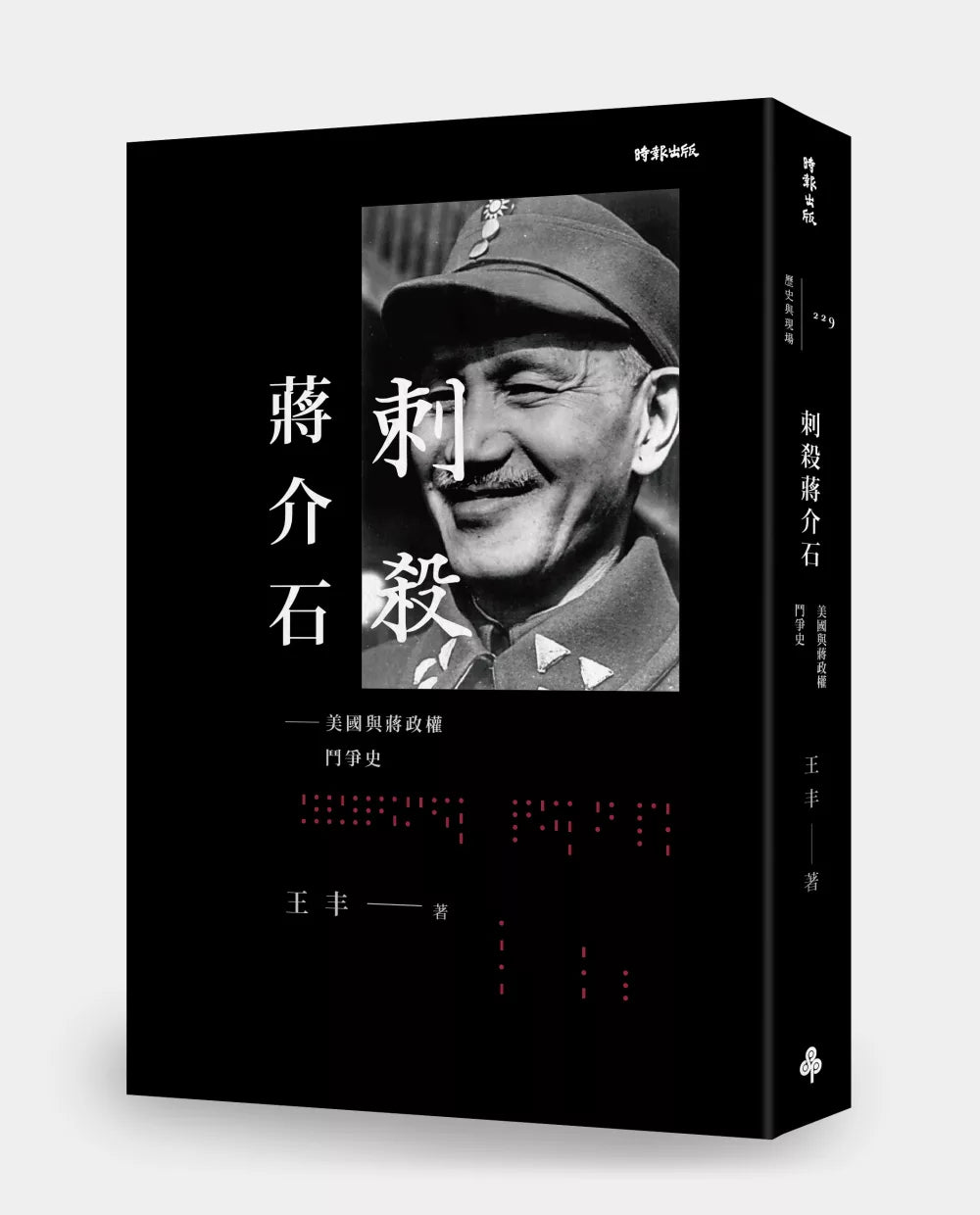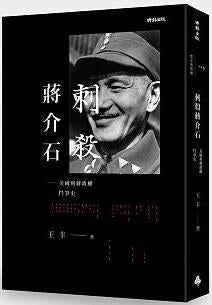1
/
of
2
The Assassination of Chiang Kai-shek: A History of the Power Struggle Between the United States and the Chiang Regime
The Assassination of Chiang Kai-shek: A History of the Power Struggle Between the United States and the Chiang Regime
Wang Feng
Regular price
$26.99 USD
Regular price
Sale price
$26.99 USD
Unit price
/
per
Low stock
Couldn't load pickup availability
About Book
About Book
Our only way to survive is to fight;
If we don't fight, there will be only death.
It is better to die in mainland China than to die in Taiwan; it is better to die on the battlefield than to be betrayed by the Americans!
~Excerpts from Chiang Kai-shek's speech in October 1961
The assassination of Chiang Kai-shek was not a sensational political rumor or a forgotten historical event. Instead, it epitomized the three-way political struggle among the United States, the Chiang Kai-shek regime, and the Chinese Communist Party. It also exemplified the situation faced by Asian countries during the Cold War: Vietnamese President Ngo Dinh Diem was executed by a coup in 1963; South Korean President Syngman Rhee was forced to resign in 1960; Indonesian President Sukarno was forced to step down in a bloody coup in 1965; South Korean President Park Chung-hee was brutally murdered in 1979; and Philippine President Marcos, who narrowly won the 1986 election, fled into exile in the United States.
The author of this book, Wang Feng, searched and reviewed historical archival materials to reconstruct the political struggle situation since China's eight-year War of Resistance Against Japanese Aggression, leading readers back to the dangerous political environment of that time and understanding the twilight state of mind of Chiang Kai-shek, a generation of political and military strongman. The book reveals the hidden political undercurrents and struggles surrounding the Blue Whale Project, Sun Liren's coup, the fall of Ye Gongchao, the Liu Ziran case, and the Kuo-kuang Project. It recounts the friendships and conflicts between Chiang Kai-shek and figures of the Republic of China, including Dong Xianguang, Dai Li, Kong Xiangxi, Song Ziwen, and Ye Gongchao. It examines the history of nuclear weapons development from the Republic of China to Taiwan, describing how Chiang Kai-shek and his regime established the academic and military systems for nuclear energy, only to face repeated betrayals in the media and intelligence wars with the United States, ultimately failing to achieve their goals. The hope of a mainland counterattack and a return to China seemed like a pipe dream. The truths and illusions of history, the ups and downs of characters, are vividly brought to life through the author's deft pen.
As the author writes, this book will reveal:
Why do mysterious air crashes repeatedly occur on Camelback Route, a WWII aircraft cemetery?
Why did Dai Li, the "most mysterious figure in Asia" and head of the Military Intelligence Bureau, choose newspaper writer Dong Xianguang as his mentor?
Chiang Kai-shek held Sun Liren under house arrest for 33 years. Was this renowned general a traitor? Or a loyalist?
Whose secret report caused diplomat Ye Gongchao to be demoted overnight?
What kind of US-Chiang struggle was behind the public opinion regarding the May 24th Incident, in which American soldiers shot and killed Taiwanese?
When the United States wanted to lend nuclear bombs to Chiang Kai-shek to fight against the Chinese Communist Party, did Chiang accept it?
Yu Dawei and Wu Dayou built a nuclear weapons path for Chiang Kai-shek. Where did the relevant talents later go?
From the Hsinchu Project and Taoyuan Project to Chang Yi-hsien's defection, why has Taiwan's nuclear weapons development been consistently obstructed by the US government?
"From the very beginning, the US-Chiang Kai-shek collaboration was fraught with extremely subtle contradictions and conflicts. The two sides were always in a relationship of mutual distrust and suspicion, a 'sleeping in different beds' of both cooperation and struggle. Besides the fear that Chiang Kai-shek would 'counterattack the mainland' and trigger the fuse of world war, another important and paramount concern was the US's territorial ambitions towards Taiwan." -- Wang Feng
If we don't fight, there will be only death.
It is better to die in mainland China than to die in Taiwan; it is better to die on the battlefield than to be betrayed by the Americans!
~Excerpts from Chiang Kai-shek's speech in October 1961
The assassination of Chiang Kai-shek was not a sensational political rumor or a forgotten historical event. Instead, it epitomized the three-way political struggle among the United States, the Chiang Kai-shek regime, and the Chinese Communist Party. It also exemplified the situation faced by Asian countries during the Cold War: Vietnamese President Ngo Dinh Diem was executed by a coup in 1963; South Korean President Syngman Rhee was forced to resign in 1960; Indonesian President Sukarno was forced to step down in a bloody coup in 1965; South Korean President Park Chung-hee was brutally murdered in 1979; and Philippine President Marcos, who narrowly won the 1986 election, fled into exile in the United States.
The author of this book, Wang Feng, searched and reviewed historical archival materials to reconstruct the political struggle situation since China's eight-year War of Resistance Against Japanese Aggression, leading readers back to the dangerous political environment of that time and understanding the twilight state of mind of Chiang Kai-shek, a generation of political and military strongman. The book reveals the hidden political undercurrents and struggles surrounding the Blue Whale Project, Sun Liren's coup, the fall of Ye Gongchao, the Liu Ziran case, and the Kuo-kuang Project. It recounts the friendships and conflicts between Chiang Kai-shek and figures of the Republic of China, including Dong Xianguang, Dai Li, Kong Xiangxi, Song Ziwen, and Ye Gongchao. It examines the history of nuclear weapons development from the Republic of China to Taiwan, describing how Chiang Kai-shek and his regime established the academic and military systems for nuclear energy, only to face repeated betrayals in the media and intelligence wars with the United States, ultimately failing to achieve their goals. The hope of a mainland counterattack and a return to China seemed like a pipe dream. The truths and illusions of history, the ups and downs of characters, are vividly brought to life through the author's deft pen.
As the author writes, this book will reveal:
Why do mysterious air crashes repeatedly occur on Camelback Route, a WWII aircraft cemetery?
Why did Dai Li, the "most mysterious figure in Asia" and head of the Military Intelligence Bureau, choose newspaper writer Dong Xianguang as his mentor?
Chiang Kai-shek held Sun Liren under house arrest for 33 years. Was this renowned general a traitor? Or a loyalist?
Whose secret report caused diplomat Ye Gongchao to be demoted overnight?
What kind of US-Chiang struggle was behind the public opinion regarding the May 24th Incident, in which American soldiers shot and killed Taiwanese?
When the United States wanted to lend nuclear bombs to Chiang Kai-shek to fight against the Chinese Communist Party, did Chiang accept it?
Yu Dawei and Wu Dayou built a nuclear weapons path for Chiang Kai-shek. Where did the relevant talents later go?
From the Hsinchu Project and Taoyuan Project to Chang Yi-hsien's defection, why has Taiwan's nuclear weapons development been consistently obstructed by the US government?
"From the very beginning, the US-Chiang Kai-shek collaboration was fraught with extremely subtle contradictions and conflicts. The two sides were always in a relationship of mutual distrust and suspicion, a 'sleeping in different beds' of both cooperation and struggle. Besides the fear that Chiang Kai-shek would 'counterattack the mainland' and trigger the fuse of world war, another important and paramount concern was the US's territorial ambitions towards Taiwan." -- Wang Feng
Publication Date
Publication Date
2015-10-20
Publisher
Publisher
時報出版
Imprint
Imprint
Pages
Pages
472
ISBN
ISBN
9789571364308
share



